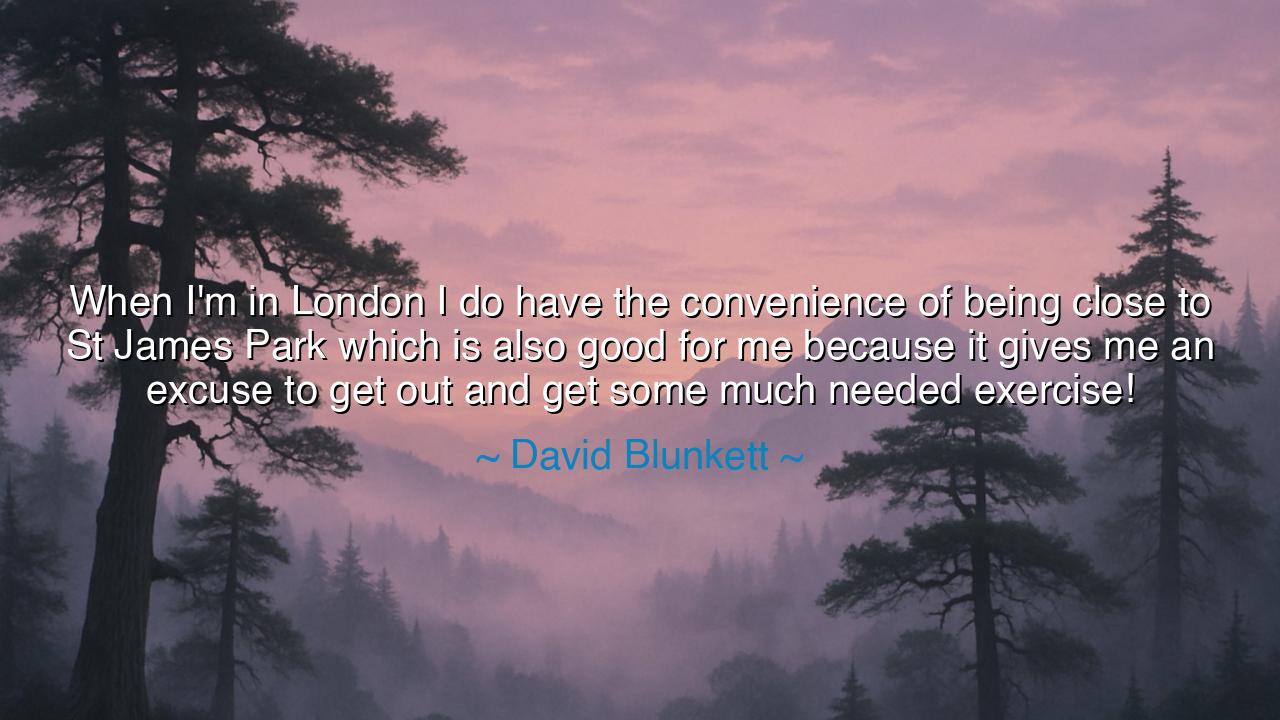
When I'm in London I do have the convenience of being close to
When I'm in London I do have the convenience of being close to St James Park which is also good for me because it gives me an excuse to get out and get some much needed exercise!






Hear, O listeners, the words of David Blunkett: “When I’m in London I do have the convenience of being close to St James’s Park, which is also good for me because it gives me an excuse to get out and get some much-needed exercise!” At first, they may seem plain and practical, but hidden within them lies a lesson that reaches across the ages: the wisdom of seeking balance, of honoring the body through motion, and of finding in nature a sanctuary amidst the burdens of public life.
For London, the great city of stone and bustle, is a place that can weary the spirit. Its noise, its unending labors, its crowded streets press upon the soul like a heavy mantle. Yet within it lie oases such as St James’s Park, where water, trees, and sky remind man of his bond to nature. To walk there is not only to stretch the limbs, but to refresh the mind, to step outside the machinery of duty and rediscover the rhythm of life. Blunkett reminds us that the exercise of the body is also the medicine of the soul.
The ancients knew this truth well. The Greeks proclaimed the harmony of mens sana in corpore sano—a sound mind in a sound body. Their philosophers did not scorn the gymnasium, but entered it, knowing that wisdom grows dim if the vessel that carries it is neglected. The Roman senators, too, would walk their gardens after debate, finding solace in the ordered beauty of nature. Thus, when Blunkett seeks St James’s Park, he continues an ancient tradition: the marriage of contemplation and movement, the renewal of strength through communion with the natural world.
History gives us the shining example of Winston Churchill, who in his darkest hours of war sought reprieve not in idleness but in action. He painted, he built walls of brick with his own hands, he walked his gardens. In these simple tasks he found the strength to endure the crushing weight of decision. What Churchill found in the garden, Blunkett finds in the Park—a place where exercise becomes not trivial but essential, a safeguard against despair and exhaustion.
And note well the humility in his words: “It gives me an excuse.” How often do we need such excuses! For man, absorbed in his labors, convinces himself that there is no time for the care of the body. Yet Blunkett shows us that the smallest reasons—a park nearby, a moment of leisure—are enough to draw us outward, into the movement that sustains life. He acknowledges what many forget: that exercise is not vanity, but necessity, as much a duty as eating or resting.
The lesson, then, is clear. Do not let the weight of the world, of work, or of ambition deny you the gift of movement. Seek the parks, the gardens, the paths that lie near you, and let them be your sanctuary. Walk when you are weary, breathe when you are burdened, and remember that even the busiest soul requires renewal. To care for your body is to honor your spirit; to neglect it is to invite weakness of both flesh and mind.
Practically, this means: carve out time each day, no matter how small, to step outside and move. If you dwell in a city, seek its green spaces; if you live in the countryside, walk its fields. Do not think it trivial. A simple walk, a short time of exercise, can restore clarity, energy, and peace. And if you need an “excuse,” let the wisdom of this saying be your justification.
Therefore, O seekers of balance, remember Blunkett’s words. Even in the heart of London, amidst the weight of politics and duty, he finds strength in the Park, and so may you. Let us learn from him and from the ancients: that health of body and soul walk hand in hand, and that in the simplest acts of care we find the strength to endure the heaviest burdens of life.






AAdministratorAdministrator
Welcome, honored guests. Please leave a comment, we will respond soon